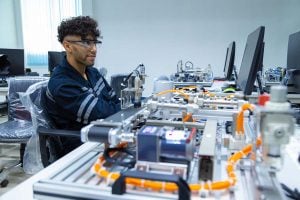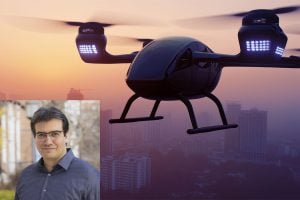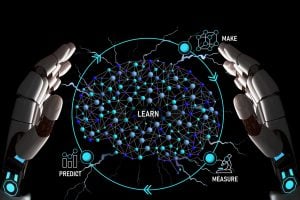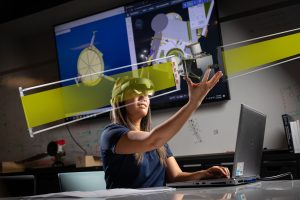
Mechanical Engineering Program Overview
As one of the oldest and broadest fields of engineering, the mechanical engineering master’s programs offer you incredible flexibility to pursue your interests while the part-time nature of the program allows you to do so at your own pace.
Instructors are executive-level mechanical engineers who deepen your understanding of the fundamentals and introduce you to modern technologies and theories. Learn to use advanced analysis techniques, translate mechanical engineering problems into a quantitative form, and analyze experiments. You also have the option to take elective courses from other Engineering for Professionals programs—giving you the control to gain the precise knowledge you seek.
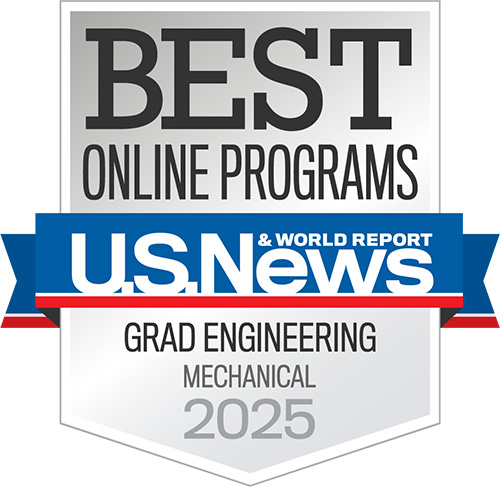
Upon graduation, you will:
- Master advanced techniques of analysis and modern tools.
- Translate practical mechanical engineering problems into a quantitative form amenable to an analytical or numerical solution, or to experimental investigation.
- Analyze, interpret, and apply the information obtained by experiment, computation, or analysis, or available in the literature.
- Choose a specialization that best fits your area of interest.
- Apply knowledge, facts, and theories immediately in your work outside the classroom.
Master’s Degree Focus Areas
A focus area must be selected. While required to narrow your study, your focus area will not appear on your degree.
- Advanced Manufacturing: In this focus area students study the automation of design and manufacturing systems including computer-aided design (CAD), computer-aided engineering (CAE), computer-aided manufacturing (CAM), and robotics. They will gain understanding of the relationships between process machinery, process conditions, and material properties, as well as learn to design precision machines, instruments, and mechanisms through an understanding of gears, bearings, actuators, and sensors. They will develop a clear understanding of positional repeatability and accuracy as well as sources of machine and instrumentation errors. Students will also gain broad knowledge in smart automation, intelligent sensing, computer-integrated manufacturing, quality control, supply chain coordination, and explore the latest manufacturing processes in high-tech industries. This focus area prepares students for careers driving digital transformation in manufacturing. With exposure to both technical and analytical methods for advanced manufacturing, graduates will be ready to excel in cross-disciplinary engineering roles driving manufacturing innovation, efficiency, and competitiveness through digitalization and smart automation.
- Aerospace Engineering: In this focus area students will study the analysis, design, and development of aircraft, spacecraft, satellites, and rockets. They will gain broad foundations in aerodynamics, aerospace materials, structures, propulsion, flight dynamics, orbital mechanics, systems integration, and aerospace manufacturing. Students will explore topics such as aerodynamic analysis, computational fluid dynamics, aircraft structures, attitude determination and control, trajectory optimization, and propulsion. With exposure to core aeronautics and astronautics principles, graduates are prepared for rewarding careers advancing aerospace science and technologies through analysis, modeling, simulation, and development roles across the aerospace and defense industries.
- Biomechanics: In this focus area the students apply mechanical engineering principles to understand the mechanics of biological systems and the human body. They will study topics related to the musculoskeletal system, cardiovascular system, human motion, and flow within the body through a mechanics perspective. They will gain core knowledge in solid and fluid mechanics relating to tissues, organs, and overall body function. Students will learn about constitutive models for structures like bone, cartilage, ligaments, skin, and vessels, as well as analyze dynamics and motor control for movement and examine design requirements for medical implants and prosthetics. With a blend of mechanics fundamentals and bioengineering applications, graduates are prepared for biomedical and healthcare careers advancing patient treatment, diagnostics, and human recovery via technology innovations.
- Fluid and Thermal Mechanics: In this focus area the students will develop advanced knowledge in fluid mechanics, thermodynamics, and heat transfer. They will study the fundamentals of fluid flow, multiphase flows, thermodynamics, and heat exchange processes. Additionally, they will explore topics such as computational fluid dynamics, heat exchanger design, combustion, mass transfer, and renewable power systems. They will examine a variety of single and multiphase fluid flow problems – including non-Newtonian flows, compressible flow, turbulence, boundary layers, and microfluidics. They will also understand solution methods for the transport of heat by conduction, convection, radiation, and phase change. Students will gain experience with analyzing and designing thermal-fluid systems and components such as turbines, pumps, valves, reactors, heat exchangers, and piping systems. They will also leverage computational methods and simulations tools for modeling complex thermofluids phenomena. Graduates are equipped for engineering careers related to processing plants, energy systems, propulsion, microfluidics, HVAC, and emerging fields in renewable energies.
- Hypersonic Technologies: In this focus area the students will study the complex multidisciplinary challenges associated with sustained hypersonic flight, spanning speeds from Mach 5 to orbital velocities. Students will learn the fundamentals of high-speed aerodynamics, propulsion, materials, controls, and thermal management unique to the hypersonic flight regime. They will explore topics such as scramjet/ramjet engines, high-temperature materials, plasma flow interactions, boundary layer transition, heat transfer, and guidance/navigation of hypervelocity vehicles. Students will examine the capabilities of existing and proposed hypersonic aircraft, re-entry vehicles, rocket systems, and space launchers. They will also understand the technology barriers and physical constraints that influence cruise and acceleration performance, range, maneuverability and survivability. With a balanced exposure to theoretical and practical problems, this focus area prepares students for developing cutting-edge aerospace crafts, defense systems, or fundamental research focused on expanding the horizons of high-speed flight. Graduates will be equipped to take on lingering challenges in aerodynamic design, propulsion integration, materials development and flight control for practical hypersonic vehicles.
- Ocean Engineering: In this focus area students study the design, construction, and operation of equipment and systems for marine environments. Learn about naval architecture, ocean structures, underwater vehicles, ocean observing systems, coastal engineering, and marine renewable energy. Student will also explore topics such as ship hydrodynamics, offshore platforms, subsea pipelines, ocean instrumentation, wave/tidal energy, and environmental monitoring. This focus area prepares students for careers in shipbuilding, offshore oil/gas, ocean research, marine industries, and alternative ocean energy.
- Robotics, Dynamics, and Controls: In this focus area students study different aspects of robot motion planning including rigid and compliant body kinematics, trajectory optimization, robust and adaptive control, machine vision, and mapping. Students will also learn how to analyze dynamics and control for robotic manipulators and mobile systems. Additionally, students will gain hands-on experience programming autonomous ground vehicles, aerial robots, robotic arms and/or self-driving miniature cars. Students Learn classical feedback control techniques as well as modern optimal, adaptive, intelligent and learning control methodologies. Students will ultimately gain cross-disciplinary knowledge to tackle advanced automation and robotics problems across domains such as manufacturing, surgery, transportation, defense and more. The focus area provides strong foundations for robotics specialized research or industry careers.
- Mechanics of Materials and Structures: In this focus area the students develop an in-depth understanding of solid mechanics and its application to analyzing structural systems across scale (from microelectromechanical systems to infrastructures). The curriculum provides core knowledge on stress and strain analysis of structural components, elasticity, plasticity, and failure/fracture mechanics, fatigue, creep, and advanced material models, vibration analysis with analytical and computational methods. Additionally, the focus area covers multi-scale modeling of material systems, characterization of material properties, design and analysis of mechanical components, dynamic simulation and testing of structures, and utilizing tools such as finite element analysis in the design and prediction process. This focus area will prepare you to apply advanced mechanics principles to tackle real-world structural analysis and design problems across applications in aerospace, automotive, civil, marine, biomechanical, and other engineering systems. Our cross-cutting mechanics education prepares students for engineering careers or research related to modeling, testing, design, and development of advanced materials and structural systems by providing both theoretical grounding and practical experience applying concepts to analyze complex structural systems across length scales.
FOCUS AREA REQUIREMENTS
Programs
We offer two program options for Mechanical Engineering; you can earn a Master of Science in Mechanical Engineering or a Certificate in Mechanical Engineering. Both of these programs have the option to be completed online.
Mechanical Engineering Courses
Get details about course requirements, prerequisites, focus areas, and electives offered within the program. All courses are taught by subject-matter experts who are executing the technologies and techniques they teach. For exact dates, times, locations, fees, and instructors, please refer to the course schedule published each term.
Program Contacts
-
 Email:jelawady@jhu.edu
Email:jelawady@jhu.edu
-
 Email:cstiles1@jhu.edu
Email:cstiles1@jhu.edu
-
 Email:michael.boyle@jhuapl.edu
Email:michael.boyle@jhuapl.edu
-
Email:inolan1@jhu.edu
-
Email:Brittany.Quinn@jhuapl.edu
Tuition and Fees
Did you know that 78 percent of our enrolled students’ tuition is covered by employer contribution programs? Find out more about the cost of tuition for prerequisite and program courses and the Dean’s Fellowship.
“The EP program gave me the opportunity to access one of the best schools in the nation with some of the most brilliant minds in the nation from the other side of the country. It had many challenging courses with valuable information that helped me individually and professionally. ”
Why Hopkins?
With the mechanical engineering master’s program from Johns Hopkins Engineering for Professionals, you’ll turn your ambition into a career.

Learn on Your Terms - Develop the in-demand knowledge to achieve your personal career goals in your field of choice—on your schedule. Choose modern, relevant courses to design the learning experience that best fits your objectives.
Engineers See the World Differently - Watch our video to revisit the inspiration that sparked your curiosity in science and engineering.

Industry-Specific Knowledge - Unique to Engineering for Professionals, faculty are senior-level, notable professionals who are the decision-makers and changemakers in the industry. For you, this means you learn the latest techniques, technologies, and solutions-based strategies to start enhancing your career, immediately. Learn More
Mechanical Engineering FAQs
You can still apply for the Mechanical Engineering program even if you don’t have a background in engineering. You must at least meet the program’s course prerequisites. You can take these courses through Johns Hopkins.
Yes, however, if you are transferring a course it must be a graduate-level course, the course cannot have been used to complete another degree, and your 5-year clock of completing your degree begins on the day you enroll in your first graduate class (including any transfer graduate courses). You may be able to waive a foundational course which would allow you the opportunity to take more advanced courses in your 10-course program sequence.
The Engineering for Professionals program was designed to be part-time and online with working professionals in mind. Therefore, we offer both synchronous and asynchronous courses to accommodate your busy schedule. Most of our courses are offered fully online, letting you work and study when and where is best for you.
On average, mechanical engineers who hold a master’s of science in mechanical engineering can expect to earn upwards of $85,000.
Academic Calendar
Find out when registration opens, classes start, transcript deadlines and more. Applications are accepted year-round, so you can apply any time.
